Dear Zazie, Here is today’s Lovers’ Chronicle from Mac Tag to his muse. Follow us on twitter @cowboycoleridge. Is someone always on your mind? Rhett
The Lovers’ Chronicle
Dear Muse,
© copyright 2020 mac tag/cowboycoleridge
words in the sun
melody in the moonlight
tempo
sadness
laughter (we have purpose)
feelin’ (anything but typical)
expression of the vision
as one before the sunrise
mystery
normal state
noble and touchin’, ramblin’s
song of the remembrance of us
notice, please
© copyright 2018 mac tag/cowboy coleridge all rights reserved
in and out of focus
those summer nights
a few constants;
your eyes, your smile
i will know i am done
if ever i cannot
remember your smile
by and by,
summer nights
our only purpose
indulgence
in each other
do you remember
do you think about
those summer nights
© copyright 2017 mac tag/cowboy Coleridge all rights reserved
The lies you’ve told
The soul you’ve sold
The troubles you’ve stirred
The lines you’ve blurred
© copyright 2012 mac tag cowboy Coleridge all rights reserved
He was the founder of the competing school to the more gritty view of nature as expressed by Caravaggio. He was one of the founders of the Accademia degli Incamminati along with his brother and cousin. The academy helped propel painters of the School of Bologna to prominence.
He travelled to Venice (1582, 1587–1589) and Parma (1586–1587). Together with Annibale and Ludovico he worked in Bologna on the fresco cycles in Palazzo Fava(Histories of Jason and Medea, 1584) and Palazzo Magnani (Histories of Romulus, 1590–1592). In 1592 he also painted the Communion of St. Jerome, now in the Pinacoteca di Bologna and considered his masterwork. From 1586 is his altarpiece of the Madonna with Child and Saints, in the National Gallery of Parma. In 1598 Carracci joined his brother Annibale in Rome, to collaborate on the decoration of the Gallery in Palazzo Farnese. From 1598–1600 is a triple Portrait, now in Naples, an example of genre painting. In 1600 he was called to Parma by Duke Ranuccio I Farnese to begin the decoration of the Palazzo del Giardino, but he died before it was finished.
Agostino’s son Antonio Carracci was also a painter, and attempted to compete with his father’s Academy.
An engraving by Carraci after the painting Love in the Golden Age by the 16th-century Flemish painter Paolo Fiammingo was the inspiration for Matisse’s Le bonheur de vivre (Joy of Life).
Gallery
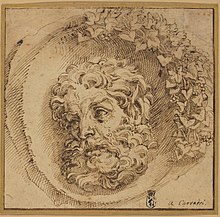

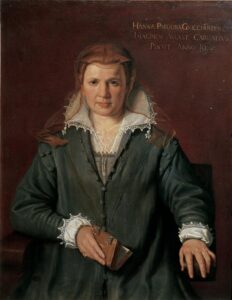
portrait of Anna Parolini Guicciardini, painted in 1598
-
 Cupid and Pan
Cupid and Pan -
 Ninfa satiretto e putto
Ninfa satiretto e putto -
 Reciproco Amore or Love in the Golden Age
Reciproco Amore or Love in the Golden Age -
Vênus punindo Eros
-
 Aurora e Cefalo, Cartone Galleria Farnese
Aurora e Cefalo, Cartone Galleria Farnese -
 Love Conquers All (Omnia vincit Amor), in a struggle with a satyr Amor places his right knee on its thigh, two nude nymphs are seated with interlocking legs at the base of a tree
Love Conquers All (Omnia vincit Amor), in a struggle with a satyr Amor places his right knee on its thigh, two nude nymphs are seated with interlocking legs at the base of a tree -
 Ogni cosa vince l’oro
Ogni cosa vince l’oro -
 Omnia Vincit Amor
Omnia Vincit Amor -
 Orpheus and Eurydice
Orpheus and Eurydice -
 Satyr whipping a nymph, who is shown from behind and bound to a tree, a second satyr bearing a club stands in the middle ground
Satyr whipping a nymph, who is shown from behind and bound to a tree, a second satyr bearing a club stands in the middle ground -
 Sine Cerere et Baccho Friget Venus
Sine Cerere et Baccho Friget Venus
| Jules Laforgue | |
|---|---|
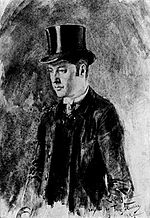
Portrait of Laforgue, 1885
|
|
Today is the birthday of Jules Laforgue (Montevideo, Uruguay; 16 August 1860 – 20 August 1887 Paris); poet, often referred to as a Symbolist poet. Perhaps influenced by Walt Whitman, Laforgue was one of the first French poets to write in free verse.
In 1886 he married Leah Lee, an Englishwoman. He died the next year of tuberculosis at the age of 27. His wife followed him shortly thereafter.
Verse
Dans l’orgue qui par déchirements se châtie,
Croupir, des étés, sous des vitraux, en langueur ;
Mourir d’un attouchement de l’Eucharistie,
S’entrer un crucifix maigre et nu dans le cœur ?
-
« Complainte propitiatoire à l’inconscient », dans Les Complaintes et les premiers poèmes (1885), Jules Laforgue, éd. Gallimard, coll. Poésie, 1979, p. 41
Va, que ta seule étude
Soit de vivre sans but, fou de mansuétude
| Charles Bukowski | |
|---|---|
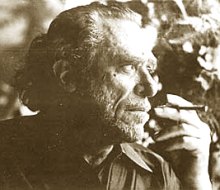 |
|
Today is the birthday of Henry Charles Bukowski (born Heinrich Karl Bukowski in Andernach, Rhineland-Palatinate, Germany; August 16, 1920 – March 9, 1994 San Pedro, Los Angeles); poet, novelist, and short story writer. His writing was influenced by the social, cultural, and economic ambience of his home city of Los Angeles. His work addresses the ordinary lives of poor Americans, the act of writing, alcohol, relationships with women, and the drudgery of work. In 1986 Time called Bukowski a “laureate of American lowlife”.
Bukowski embarked on a series of love affairs. One of these relationships was with Linda King, a poet and sculptor. His other affairs were with a recording executive and a 23-year-old redhead. He wrote a book of poetry as a tribute to his love for the redhead, titled, “Scarlet” (Black Sparrow Press, 1976). His various affairs and relationships provided material for his stories and poems. Another important relationship was with “Tanya”, pseudonym of “Amber O’Neil” (also a pseudonym), described in Bukowski’s “Women” as a pen-pal that evolved into a weekend tryst at Bukowski’s residence in Los Angeles in the 1970s. “Amber O’Neil” later self-published a chapbook about the affair entitled “Blowing My Hero”.
In 1976, Bukowski met Linda Lee Beighle, a health food restaurant owner, rock-and-roll groupie, aspiring actress and devotee of Meher Baba. Two years later Bukowski moved from the East Hollywood area, where he had lived for most of his life, to the harborside community of San Pedro, the southernmost district of the City of Los Angeles. Beighle followed him and they lived together intermittently over the next two years. They were eventually married by Manly Palmer Hall, a Canadian-born author and mystic, in 1985. Beighle is referred to as “Sarah” in Bukowski’s novels Women and Hollywood.
“Somebody […] asked me: ‘What do you do? How do you write, create?’ You don’t, I told them. You don’t try. That’s very important: ‘not’ to try, either for Cadillacs, creation or immortality. You wait, and if nothing happens, you wait some more. It’s like a bug high on the wall. You wait for it to come to you. When it gets close enough you reach out, slap out and kill it. Or if you like its looks you make a pet out of it.”
Verse and Prose
- It’s 4:30 in the morning, it’s always 4:30 in the morning.
- Rooming House Madrigals (1954)
- Van Gogh writing his brother for paints
Hemingway testing his shotgun
Celine going broke as a doctor of medicine
the impossibility of being human
Shakespeare a plagiarist
Beethoven with a horn stuck into his head against deafness
the impossibility the impossibility
Nietzsche gone totally mad
the impossibility of being human
all too human
this breathing
in and out
out and in
these punks
these cowards
these champions
these mad dogs of glory
moving this little bit of light toward us
impossibly.- “Beasts Bounding Through Time” (1986)
- I’ve never met another man I’d rather be.
- in Bukowski: Born Into This (2002)
- I walk through rooms of the dead, streets of the dead, cities of the dead: men without eyes, men without voices; men with manufactured feelings and standard reactions; men with newspaper brains, television souls and high school ideals.
- in Sunlight Here I Am: Interviews and Encounters, 1963-1993 (2003), p. 24
Notes of a Dirty Old Man (1969)
- Live, shit, drinking and smoking should be the daily bread of all poets.
- If you want to know who your friends are, get yourself a jail sentence.
- An intellectual is a man who says a simple thing in a difficult way; an artist is a man who says a difficult thing in a simple way.
- The difference between a brave man and a coward is a coward thinks twice before jumping in the cage with a lion. The brave man doesn’t know what a lion is. He just thinks he does.
Tales of ordinary madness (1967-83)
- I was given the job of milking the cows, finally, and it got me up earlier than anybody. But it was kind of nice, pulling at those cows’ tits (pg. 172).
- Show me a man who lives alone and has a perpetually clean kitchen, and eight times out of nine I’ll show you a man with detestable spiritual qualities.
- The free soul is rare, but you know it when you see it – basically because you feel good, very good, when you are near or with them.
Post Office (1971)
- It began as a mistake.
- But I couldn’t help thinking, god, all these mailmen do is drop in letters and get laid. This is the job for me, oh yes yes yes.
- I didn’t even have a uniform, just a cap. I wore my regular clothes. The way my shackjob Betty and I drank there was hardly money for clothes.
- “MR. JONSTONE IS A FINE MAN!”
“Don’t be silly, he’s an obvious sadist,” I said.
“How long have you been in the Post Office?”
“Three weeks.”
“MR. JONSTONE HAS BEEN WITH THE POST OFFICE FOR 30 YEARS!”
“What does that have to do with it?”
“I said, MR. JONSTONE IS A FINE MAN!”
I believe the poor fellow actually wanted to kill me.
…”All right,” I said, “Jonstone is a fine man. Forget the whole… thing.” Then I walked out and took the next day off. Without pay, of course.
- I thought about taking a shower but I could see the headlines: MAILMAN CAUGHT DRINKING THE BLOOD OF GOD AND TAKING A SHOWER, NAKED, IN A ROMAN CATHOLIC CHURCH. …I found out later that mail for the church was delivered to the parish house around the corner. But now, of course, I knew where to… shower when I’m down and out.
- It was the poor part of town—small houses and courts with mailboxes full of spiders, mailboxes hanging by one nail, old women inside rolling cigarettes and chewing tobacco and humming to their canaries and watching you, an idiot lost in the rain.
- “Any damn fool can beg up some kind of job; it takes a wise man to make it without working.”
- “They wouldn’t fire me. Even the salesmen liked me. They were robbing the boss out the back door but I didn’t say anything. That was their little game. It didn’t interest me. I wasn’t much of a petty thief. I wanted the whole world or nothing.”
- “Wouldn’t you like to come in and have a cup of tea and dry off?”
“Lady, don’t you realize that we don’t even have time to pull up our shorts?”
“Pull up your shorts?”
“YES, PULL UP OUR SHORTS!” I screamed at her and walked off into the wall of water.
- “WHAT’S WRONG WITH ASSHOLES, BABY? YOU’VE GOT AN ASSHOLE, I’VE GOT AN ASSHOLE! YOU GO TO THE STORE AND BUY A PORTERHOUSE STEAK, THAT HAD AN ASSHOLE! ASSHOLES COVER THE EARTH! IN A WAY TREES HAVE ASSHOLES BUT YOU CAN’T FIND THEM, THEY JUST DROP THEIR LEAVES. YOUR ASSHOLE, MY ASSHOLE, THE WORLD IS FULL OF BILLIONS OF ASSHOLES. THE PRESIDENT HAS AN ASSHOLE, THE CARWASH BOY HAS AN ASSHOLE, THE JUDGE AND THE MURDERER HAVE ASSHOLES . . . EVEN THE PURPLE STICKINPIN HAS AN ASSHOLE!”
- “Look, you’re small-town. I’ve had over 50 jobs, maybe a hundred. I’ve never stayed anywhere long. What I am trying to say is, there is a certain game played in offices all over America. The people are bored, they don’t know what to do, so they play the office-romance game. Most of the time it means nothing but the passing of time. Sometimes they do manage to work off a screw or two on the side. But even then, it is just an offhand pasttime, like bowling or t.v. or a New Year’s Eve party. You’ve got to understand that it doesn’t mean anything and then you won’t get hurt. Do you understand what I mean?”
- “Fay had a spot of blood on the left side of her mouth and I took a wet cloth and wiped it off. Women were meant to suffer; no wonder they asked for constant declarations of love.”
- “I squeezed Fay’s hand, kissed her on the forehead. She closed her eyes and seemed to sleep then. She was not a young woman. Maybe she hadn’t saved the world but she had made a major improvement. Ring one up for Fay.”
Factotum (1975)
- I got into bed, opened the bottle, worked the pillow into a hard knot behind my back, took a deep breath, and sat in the dark looking out of the window. It was the first time I had been alone for five days. I was a man who thrived on solitude; without it I was like another man without food or water. Each day without solitude weakened me. I took no pride in my solitude; but I was dependent on it. The darkness of the room was like sunlight to me. I took a drink of wine.
- Ch. 17
- “You have a very strange face,” she said. “You’re not really ugly.” “Number four shipping clerk, working his way up.” “Have you ever been in love?” “Love is for real people.” “You sound real.” “I dislike real people.” “You dislike them?” “I hate them.” We drank some more, not saying much. It continued to snow. Gertrude turned her head and stared into the crowd of people. Then she looked at me. “Isn’t he handsome?” “Who?” “That soldier over there. He’s sitting alone. He sits so straight. And he’s got all his medals on.” “Come on, let’s get out of here.”
- Ch. 27
- That was all a man needed: hope. It was a lack of hope that discouraged a man. I remembered my New Orleans days, living on two five-cent candy bars a day for weeks at a time in order to have leisure to write. But starvation, unfortunately, didn’t improve art. It only hindered it. A man’s soul was rooted in his stomach. A man could write much better after eating a porterhouse steak and drinking a pint of whiskey than he could ever write after eating a nickel candy bar. The myth of the starving artist was a hoax.
- Ch. 29
- I couldn’t get myself to read the want ads. The thought of sitting in front of a man behind a desk and telling him that I wanted a job, that I was qualified for a job, was too much for me. Frankly, I was horrified by life, at what a man had to do simply in order to eat, sleep, and keep himself clothed. So I stayed in bed and drank. When you drank the world was still out there, but for the moment it didn’t have you by the throat.
- Ch. 31
- “Baby,” I said. “I’m a genius but nobody knows it but me.”
- Ch. 31
- “Someday,” I told Jan, “when they demonstrate that the world has four dimensions instead of just three, a man will be able to go for a walk and just disappear. No burial, no tears, no illusions, no heaven or hell. People will be sitting around and they’ll say, ‘What happened to George?’ And somebody will say, ‘Well, I don’t know. He said he was going out for a pack of cigarettes.
- Ch. 42
- My ambition is handicapped by my laziness.
- Ch. 45, Manny
- “I’ve given you my time. It’s all I’ve got to give – it’s all any man has. And for a pitiful buck and a quarter an hour.”… “my time so that you can live in your big house on the hill and have all the things that go with it. If anybody has lost anything on this deal, on this arrangement… I’ve been the loser.
- Ch. 49, Henry Chinaski
- I had first learned that I was an idiot in the school yard. I was taunted and poked at and jeered, as were the other one or two idiots. My only advantage over the other one or two, two idiots. My only advantage over the other one or two, who were beaten and chasen, was that I was sullen. When surrounded I was not terrified. They never attacked me but would finally turn on one of the others and beat them as I watched.
- Ch. 52
- “People don’t need love. What they need is success in one form or another. It can be love but it needn’t be.”
- Ch. 52
- It was true that I didn’t have much ambition, but there ought to be a place for people without ambition, I mean a better place than the one usually reserved. How in the hell could a man enjoy being awakened at 6:30 a.m. by an alarm clock, leap out of bed, dress, force-feed, shit, piss, brush teeth and hair, and fight traffic to get to a place where essentially you made lots of money for somebody else and were asked to be grateful for the opportunity to do so?
- Ch. 55
- The bus ran along a very narrow strip of cement that stood up out of the water with no guard-rail, no nothing; that’s all there was to it. The bus driver leaned back and we roared along over this narrow cement strip surrounded by water and all the people in the bus, the twenty-five or forty or fifty-two people trusted him, but I never did. Sometimes it was a new driver, and I thought, how do they select these sons of bitches? There’s deep water on both sides of us and with one error of judgement he’ll kill us all. It was ridiculous. Suppose he had an argument with his wife that morning? Or cancer? Or visions of God? Bad teeth? Anything. He could do it. Dump us all. I knew that if I was driving that I would consider the possibility or desirability of drowning everybody. And sometimes, after just such considerations, possibility turns into reality. For each Joan of Arc there is a Hitler perched at the other end of the teeter-totter. The old story of good and evil. But none of the bus drivers ever dumped us. They were thinking instead of car payments, baseball scores, haircuts, vacations, enemas, family visits. There wasn’t a real man in the whole shitload.
- Ch. 56
- Nothing is worse than to finish a good shit, then reach over and find the toilet paper container empty. Even the most horrible human being on earth deserves to wipe his ass.
- Ch.65
- I had lumps all over my body, dizzy spells, I was spitting blood, and I had gone there only to be given an appointment for three weeks later. Now like every American boy I had always been told: catch cancer early. Then you go down to catch it early and they make you wait three weeks for an appointment. That’s the difference between what we’re told and actuality.
- Ch. 70
- Janeway Smithson was a little, insane, grey-haired bantam rooster of a man. He loaded five or six of us in one cab, and we rolled down to the bed of the L.A. River. Now in those days the L.A. River was a fake – there was no water, just a wide, flat, dry cement runway. The bums lived down there by the hundreds in little cement alcoves under the bridges and overpasses. Some of them even had potted plants in front of their places. All they needed to live like kings was canned heat (Sterno) and what they picked out of the nearby garbage dump. They were tan and relaxed and most of them looked a hell of a lot healthier than the average Los Angeles business man. Those guys down there had no problems with women, income tax, landlords, burial expenses, dentists, time payments, car repairs, or with climbing into a voting booth and pulling the curtain closed.
- Ch. 71
- When I went to the Yellow Cab Company I passed the Cancer Building and I remembered that there were worse things than looking for a job you didn’t want.
- Ch. 71
- “I’m no preacher but I can tell you this-the lives that people lead are driving them crazy and their insanity comes out in the way they drive.”
- Ch. 72, Janeway Smithson
- There were always men looking for jobs in America. There were always all these usable bodies. And I wanted to be a writer. Almost everybody was a writer. Not everybody thought they could be a dentist or an automobile mechanic but everybody knew they could be a writer. Of those fifty guys in the room, probably fifteen of them thought they were writers. Almost everybody used words and could write them down, i.e., almost everybody could be a writer. But most men, fortunately, aren’t writers, or even cab drivers, and some men – many men – unfortunately aren’t anything.
- Ch. 73
- “Every man is a poet”
- Ch. 72, Henry Chinaski
Women (1978)
- I was glad I wasn’t in love, that I wasn’t happy with the world. I like being at odds with everything. People in love often become edgy, dangerous. They lose their sense of perspective. They lose their sense of humor. They become nervous, psychotic bores. They even become killers.
- Human relationships didn’t work anyhow. Only the first two weeks had any zing, then the participants lost their interest. Masks dropped away and real people began to appear: cranks, imbeciles, the demented, the vengeful, sadists, killers. Modern society had created its own kind and they feasted on each other. It was a duel to the death–in a cesspool.
- People with no morals often considered themselves more free, but mostly they lacked the ability to feel hate or love.
- Morals were restrictive, but they were grounded on human experience.
- Many a good man has been put under the bridge by a woman.
- Once a woman turns against you, forget it. They can love you, then something turns in them. They can watch you dying in a gutter, run over by a car, and they’ll spit on you.
- I was drawn to all the wrong things: I liked to drink, I was lazy, I didn’t have a god, politics, ideas, ideals. I was settled into nothingness; a kind of non-being, and I accepted it. I didn’t make for an interesting person. I didn’t want to be interesting, it was too hard. What I really wanted was only a soft, hazy space to live in, and to be left alone. On the other hand, when I got drunk I screamed, went crazy, got all out of hand. One kind of behavior didn’t fit the other. I didn’t care.
- Nothing was ever in tune. People just blindly grabbed at whatever there was: communism, health foods, zen, surfing, ballet, hypnotism, group encounters, orgies, biking, herbs, Catholicism, weight-lifting, travel, withdrawal, vegetarianism, India, painting, writing, sculpting, composing, conducting, backpacking, yoga, copulating, gambling, drinking, hanging around, frozen yogurt, Beethoven, Bach, Buddha, Christ, TM, H, carrot juice, suicide, handmade suits, jet travel, New York City, and then it all evaporated and fell apart. People had to find things to do while waiting to die. I guess it was nice to have a choice.
Ham On Rye (1982)
- And my own affairs were as bad, as dismal, as the day I had been born. The only difference was that now I could drink now and then, though never often enough. Drink was the only thing that kept a man from feeling forever stunned and useless. Everything else just kept picking and picking, hacking away. And nothing was interesting, nothing. The people were restrictive and careful, all alike. And I’ve got to live with these fuckers for the rest of my life, I thought. God, they all had assholes and sexual organs and their mouths and their armpits. They shit and they chattered and they were dull as horse dung. The girls looked good from a distance, the sun shining through their dresses, their hair. But get up close and listen to their minds running out of their mouths, you felt like digging in under a hill and hiding out with a tommy-gun. I would certainly never be able to be happy, to get married, I could never have children. Hell, I couldn’t even get a job as a dishwasher.
- The problem was you had to keep choosing between one evil or another, and no matter what you chose, they sliced a little more off you, until there was nothing left. At the age of 25 most people were finished. A whole goddamned nation of assholes driving automobiles, eating, having babies, doing everything in the worst way possible, like voting for the presidential candidate who reminded them most of themselves. I had no interests. I had no interest in anything. I had no idea how I was going to escape. At least the others had some taste for life. They seemed to understand something that I didn’t understand. Maybe I was lacking. It was possible. I often felt inferior. I just wanted to get away from them. But there was no place to go.
The Last Night of the Earth Poems (1992)
- on the radio I heard the news
of that day
at least 6 times, I was
well versed in world
affairs.
the remainder of the stations played a
thin, sick music.
the classical stations refused to come in
clearly
and when they did
it was a stale repetition of standard and
tiresome works. - I turned the radio off.
a strange whirling began in my
head—it circled behind the forehead, clockwise…
I began to wonder, is this what happens
when one goes
mad?- “jam”
- I was still proud of that moment
back then
when Jed handed me
that pint
and
I drained
a third of it
with all the disciples
watching.
damn, there was no way
it seemed
we could ever
lose
but we did. - and it took me
3 or 4 decades to
move on just a
little.
and Jed,
if you are still here
tonight,
(I forgot to tell you
then)
here’s a thanks
for that drink.- “two toughs”
- there’s a bluebird in my heart that
wants to get out
but I’m too tough for him,
I say, stay in there, I’m not going
to let anybody see you.
…I only let him out
at night sometimes
when everybody’s asleep.
…he’s singing a little
in there, I haven’t quite let him
die
…and it’s nice enough to
make a man
weep, but I don’t
weep, do
you?- Bluebird
- a woman can
drop
out of your
life and
forget you
real fast.
a woman
can’t go anywhere
but UP
after
leaving you,
honey.- “pulled down shade”
- there were these people
on the ground,
they were reaching up their
arms and trying to pull me
down
but
they couldn’t do
it. - I felt like pissing on
them.
they were so
jealous.
all they had to do was
to work their way
slowly up to it
as I had
done. - such people think
success grows on
trees. - you and I,
we know
better.- “transport”
Pulp (1994)
- Sometimes I felt that I didn’t even know who I was. All right, I’m Nicky Belane. But check this. Somebody could yell out, ‘Hey, Harry! Harry Martel!’ and I’d most likely answer, ‘Yeah, what is it?’ I mean, I could be anybody, what does it matter?
- Man was born to die. What did it mean? Hanging around and waiting. Waiting for the ‘A train.’ Waiting for a pair of big breasts on some August night in a Vegas hotel room. Waiting for the mouse to sing. Waiting for the snake to grow wings. Hanging around.
- Hell was what you made it.
- Sex was a trap, a snare. It was for animals.
- Something was always after a man. It never relented. No rest, ever.
The Captain is Out to Lunch and the Sailors have taken over the Ship (1998)
- There’s nothing to mourn about death any more than there is to mourn about the growing of a flower. What is terrible is not death but the lives people live or don’t live up until their death. They don’t honor their own lives, they piss on their lives. They shit them away. Dumb fuckers. They concentrate too much on fucking, movies, money, family, fucking. Their minds are full of cotton. They swallow God without thinking, they swallow country without thinking. Soon they forget how to think, they let others think for them. Their brains are stuffed with cotton. They look ugly, they talk ugly, they walk ugly. Play them the great music of the centuries and they can’t hear it. Most people’s deaths are a sham. There’s nothing left to die.
- We’re all going to die, all of us, what a circus! That alone should make us love each other but it doesn’t. We are terrorized and flattened by trivialities, we are eaten up by nothing.
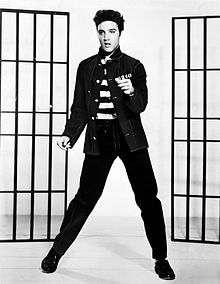 But today has to be all about the King. Today is the anniversary of the death of Elvis. Or if you prefer, today is the anniversary of the day he disappeared. So in his honour and for you muse, here is the song of the day:
But today has to be all about the King. Today is the anniversary of the death of Elvis. Or if you prefer, today is the anniversary of the day he disappeared. So in his honour and for you muse, here is the song of the day:
Always on My Mind
Maybe I didn’t treat you
Quite as good as I should have
Maybe I didn’t love you
Quite as often as I could have
Little things I should have said and done
I just never took the time
You were always on my mind
You were always on my mind
Tell me, tell me that your sweet love hasn’t died
Give me, give me one more chance
To keep you satisfied, satisfied
Maybe I didn’t hold you
All those lonely, lonely times
And I guess I never told you
Im so happy that you’re mine
If I make you feel second best
Girl, Im sorry I was blind
You were always on my mind
You were always on my mind
Tell me, tell me that your sweet love hasn’t died
Give me, give me one more chance
To keep you satisfied, satisfied
Little things I should have said and done
I just never took the time
You were always on my mind
You are always on my mind
You are always on my mind
written by Johnny Christopher, Mark James and Wayne Carson
Mac Tag
The song of the day – Elvis‘s version of “Always on My Mind”
I am interested in language because it wounds or seduces me. – Roland Barthes
it
takes
a lot of
desperation
dissatisfaction
and
disillusion
to
write
a
few
good
poems.
– Charles Bukowski
I must be a mermaid. I have no fear of depths and a great fear of shallow living. – Anais Nin
No sane man will dance. ~ Cicero
I could not admit then, as I do now, the essential tragic fact: I love you with all my heart and soul and body. – Sylvia Plath

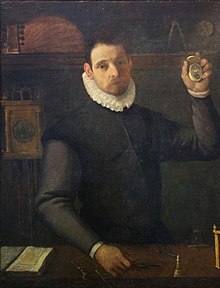

No Comments on "The Lovers’ Chronicle 16 August – summer nights – art by Agostino Carracci – birth of Jules Laforgue & Charles Bukowski – Death of Elvis"